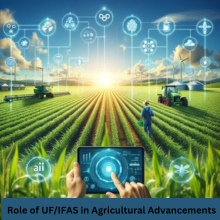
For the sixth year in a row, the University of Florida (UF) has been ranked as the top university in the nation for agricultural research investment. This recognition comes from the National Science Foundation’s (NSF) Higher Education Research and Development (HERD) survey, which tracks research expenditures across U.S. colleges and universities. The university’s remarkable commitment to advancing agricultural sciences and natural resources conservation is a testament to its leadership in this critical field.
But what does this achievement mean for UF, for Florida, and for global agriculture? Let’s dive into the details of UF’s leadership in agricultural research and explore the immense contributions that have solidified its place at the top.
UF Leads the Nation in Ag Science Investments
In fiscal year 2023, UF, through its Institute of Food and Agricultural Sciences (UF/IFAS), spent a whopping $261.9 million on agricultural sciences and natural resources conservation research. This research spending is not just a number; it represents a dedicated effort to solve some of the most pressing challenges in agriculture today.
This amount places UF ahead of other top research universities like Texas A&M, Colorado State University, and the University of California, Davis—long-time leaders in agricultural research. What sets UF apart? It’s their consistent investment and focus on cutting-edge agricultural research that benefits both local and global communities.
$261.9 Million Investment in 2023
So, what does $261.9 million buy in terms of research and innovation? The funding allows UF’s nearly 600 faculty researchers to explore critical areas such as animal science, horticulture, food sciences, and natural resources conservation. These areas of focus aren’t just abstract concepts—they have real-world applications that impact farmers, food producers, and ecosystems across Florida and the world.
The investment in these fields translates to groundbreaking discoveries and innovations that help improve food security, increase agricultural sustainability, and protect the environment. For example, UF’s research is helping to develop more resilient crops, reduce the environmental impact of farming, and create more efficient systems for food production.
UF’s Dominance in Agricultural Research
UF’s dominance in agricultural research didn’t happen overnight. It has been the result of decades of commitment and hard work. Since the founding of UF/IFAS, the university has placed a high priority on agricultural research. Over the years, it has consistently ranked among the top institutions for agricultural research spending.
Role of UF/IFAS in Agricultural Advancements
The Institute of Food and Agricultural Sciences (UF/IFAS) plays a central role in UF’s agricultural research efforts. UF/IFAS is not just a department—it is a comprehensive system of researchers, faculty, and staff working across multiple disciplines to address the agricultural needs of Florida and beyond.
UF/IFAS focuses on a variety of research areas including soil health, pest management, livestock health, and sustainable farming practices. This research directly supports Florida’s $300 billion agricultural industry, one of the largest in the nation. Through UF’s research, Florida’s farmers gain access to cutting-edge knowledge and tools that help them thrive in an ever-changing agricultural landscape.
Impact on Florida’s Agricultural Industry
UF’s research has an immense impact on Florida’s agricultural industry. The state is home to thousands of farmers who rely on the latest scientific advancements to optimize crop yields, combat pests, and deal with environmental challenges. Research from UF provides these farmers with practical solutions that improve productivity while safeguarding the environment.
UF’s Research Across Multiple Disciplines
UF’s agricultural research spans several important fields, including:
- Animal Sciences: Researchers at UF are studying ways to improve livestock health, genetics, and breeding. This research helps farmers increase efficiency and profitability in animal agriculture.
- Horticulture: UF’s horticultural research focuses on improving crop varieties, increasing resistance to diseases, and optimizing growing conditions for fruits, vegetables, and ornamental plants.
- Food Sciences: The food science research at UF seeks to improve food safety, enhance food production methods, and explore new technologies that make food processing more sustainable.
- Natural Resources and Sustainability: UF also focuses on protecting natural resources, including water and soil, which are vital for sustainable agricultural practices.
Also read: Lilly Dedicates $3B to Meet Skyrocketing Obesity Drug Demand
How UF Outperforms Competitors in Agricultural Research
While universities like Texas A&M, Colorado State University, and UC Davis are well-respected in the field of agricultural research, UF stands out for several reasons.
Texas A&M, Colorado State, and UC Davis: The Competition
These universities have long been leaders in agricultural research, but UF’s unique approach sets it apart. Texas A&M, for example, is known for its focus on livestock and animal sciences. UC Davis is renowned for its work in plant breeding and crop sciences. However, UF’s commitment to interdisciplinary research—where research from various fields converges to solve complex agricultural problems—is one of the keys to its success.
Research at UF/IFAS: Collaborations and Funding
UF’s agricultural research is supported by a variety of funding sources, including federal, state, and private funding. The university also collaborates with industry leaders, government agencies, and local communities to tackle agricultural challenges.
The Role of Federal, State, and Private Funding
Federal funding plays a crucial role in UF’s research success. In 2023, UF received $529.4 million in federally sponsored research funding, marking an increase from previous years. This funding supports a wide range of research efforts, from developing sustainable farming practices to finding new ways to manage water resources.
Private funding also plays a role in supporting UF’s agricultural research. Many private companies partner with UF to explore new technologies and innovations that can benefit the agricultural industry.
Faculty and Staff at UF: The Backbone of Agricultural Research
At the heart of UF’s agricultural research success is its faculty. Nearly 600 researchers work within UF/IFAS, contributing to a variety of research projects. These faculty members bring a wealth of expertise, experience, and passion to their work, and they are committed to finding innovative solutions to agricultural challenges.
Research Facilities at UF: World-Class Infrastructure
UF is home to state-of-the-art research facilities located across the state. From advanced laboratories in Gainesville to field research stations across Florida, UF provides researchers with the tools and resources they need to conduct impactful research.
Impact of UF’s Research on National and Global Agriculture
UF’s research doesn’t just benefit Florida—it has a significant impact on national and global agriculture. The university’s research in crop science, animal health, and sustainable farming practices is helping shape the future of food production around the world. UF’s work contributes to global food security, environmental sustainability, and the development of agricultural policies that address the challenges of feeding a growing global population.
Also read: When Does Spotify Wrapped 2024 Drop? Here’s The Date
Conclusion
UF’s six-year streak at the top of the agricultural research investment rankings is a clear reflection of its dedication to advancing agricultural science. Through significant investments, cutting-edge research, and collaboration with various stakeholders, UF is helping shape the future of agriculture—not just in Florida, but across the world.
FAQs
What is UF’s rank in agricultural research investment?
UF has been ranked number one in agricultural research investment for six consecutive years, according to the National Science Foundation’s HERD survey.
How does UF’s agricultural research benefit Florida’s economy?
UF’s agricultural research supports Florida’s $300 billion agricultural industry, helping local farmers increase productivity and tackle environmental challenges.
How does UF compare to other universities in agricultural sciences?
UF outperforms other leading agricultural research institutions by focusing on interdisciplinary research and collaborating with industry, government, and private sectors.
What role do UF’s faculty and staff play in agricultural research?
UF’s nearly 600 faculty members are key to the university’s research success. They bring a wide range of expertise and work together to solve critical agricultural issues.
How is UF contributing to global food security?
UF’s agricultural research contributes to global food security by developing sustainable farming practices, improving crop varieties, and advancing food safety technologies.

